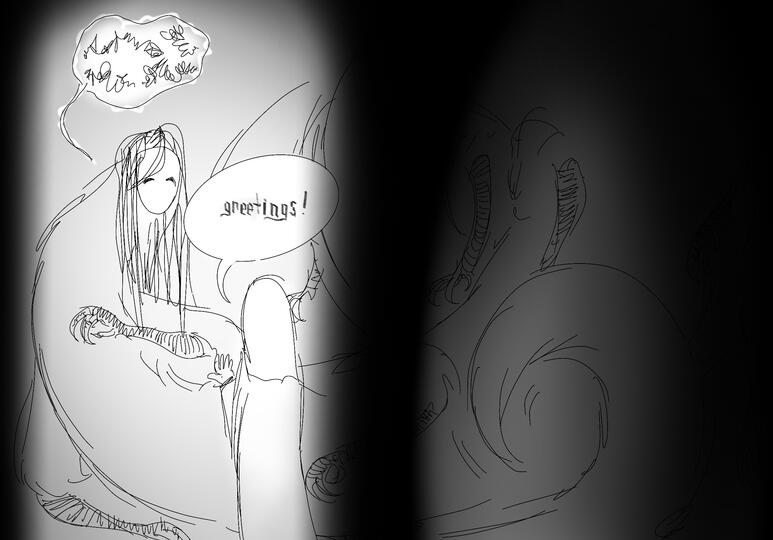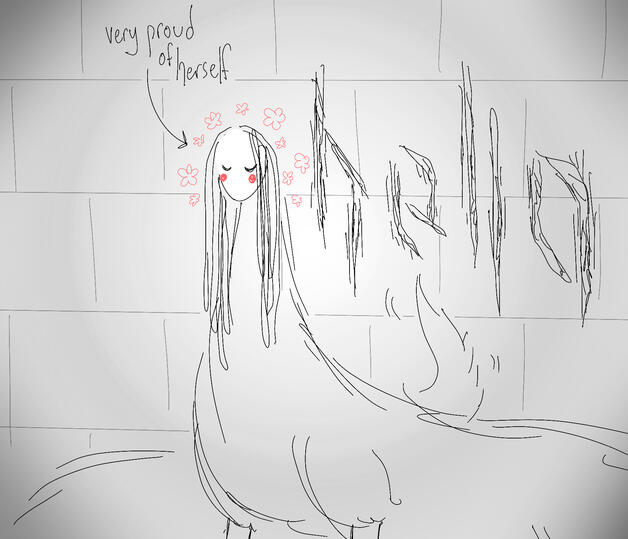A nun-shaped monster
This is an informational site about a character of mine.About: Nunster lore!
Bibliography: Interesting context!
FAQ: Please read!
Sister Unknowable has lived underneath the hill by the sea for as long as she can recall. She didn't always bear that name -- and she wasn't always awake for much of anything. But a while ago she heard a little knocking and there sat a hut atop her hill. Then that hut became a stone thing, rough-hewn. Then the stones stacked higher, and the noise of all that construction really started to get to her.She oozed up and through the cracks in the mortar, slid through the blocks until she coalesced in the deepest cellar of the abbey. Not that she knew it was an abbey, anyway -- not yet. But she did know there was a most wondrous feeling here, something she'd never noticed in all of her sleepy centuries. There was life here! Tons of it! Not the life of coneys and foxes and little brown mice, but this life of humans that seemed to burst at the edges!Sister Unknowable thought to herself, this is very much worth staying up for. She listened to the thumping of feet across cobbles, the swish of brooms in the abbey's halls, and perhaps most excitingly... the sweet ringing melodies of these humans. Their melisma was like nothing she'd ever heard, and it didn't stop when the songs ended.No, every word these humans let slip was a brand new tune unfurling. Sister Unknowable listened for a while, lingering in the corners of the cellar. She noticed after one hundred and thirty seasons of chill that the human tongue had sense to it, that their words had meaning. After a mere twenty 'years' of that, she couldn't quite sink into the walls the way she used to.Presumably her 'fur' and 'claws' were a similar byproduct of spending so much time listening to stories and legends. The humans had more recently come visiting -- she couldn't see them, never had quite been able to get that hang of that -- but she did hear them circle around the cellar much more often than they used to. She heard them use those words and a few others, too: 'long' and 'dark' and perhaps most frequently, 'wurm'.Her first attempt at a friendly 'Good Morrow!' in return sent the humans clattering up the steps, slamming the door with a bang. Sister Unknowable felt at a bit of a loss, honestly, seeing as she could no longer just up and slide back into the dark peaty earth from whence she came. She really did want to get along with these humans and their wonderful stories. She'd just need to try another approach!The 'face' was a work in progress for a while. Humans had 'eyes' that opened and closed, probably helpful with seeing, she knew that much. 'Lips' were used for speech, but Sister Unknowable couldn't make heads or tails of what those were supposed to resemble. The humans didn't often mention what these things looked like, only the way the eyes saw the 'divine', or the way lips got 'anointed' on occasion.Evidently her studies bore some benefit, the day Sister Barbara came down the cellar stairs. This human spoke in a quiet way, and with a tone of voice that was usually only used on others of her kind. She asked questions! Sister Unknowable was delighted. Her 'tail' started up with an odd thrashing about, and she felt a good wriggle coming on, and still Sister Barbara did not run away!"Aperen ye ne mene us harm. If this be sooth, pray dwelle here a while lenger. The prioresse is a queynte sort and she bad it so.""Though, Suster Unknowable, pray for to reste. Ye're full loude."
Sister Unknowable lives in the cellar of a hilltop abbey in the late 14th century in the current-day British Isles. She is a nun-shaped being with good intentions and a horrible voice.
Are you a nun? No, I'm an IT person in a costume!
Are you Catholic? No, I'm a nontheistic Quaker-ish person raised without religion.
Is this disrespectful? I hope not, but I don't get to decide what disrespect means to another person. I am giving my sincere effort to avoid disrespect.
Sincere effort? Sticking to 14th century Christian monasticism instead of current-day, avoiding movements and speech acts associated with contemporary Catholic practice while in costume, following historical accuracy to the best of my ability in construction of costume pieces to ensure less of a 'cheap Halloween' vibe.
Okay cool but why a nun then? I think monastic practice and womens' role therein during the middle ages is a really fascinating topic of study, my undergraduate degree in medieval art history sent me down this road a decade ago. On a more personal level the topic of silent contemplation and habitual intellectual/spiritual practice is very resonant to me.
Sure thing, why a nun monster? I'm not good enough at video games to play Bloodborne so I couldn't justify a cosplay from that. Then Zelda got turned into a dragon in Tears of the Kingdom. Then I got back into reading some old academic texts from undergrad and here we are.
BOOKS - explore these authors further for more relevant scholarship!
Bynum, Caroline Walker. Holy Feast and Holy Fast. Univ of California Press, 7 Jan. 1988.Crampton, Georgia Ronan. The Shewings of Julian of Norwich. ISD LLC, 1 Sept. 1994.Hamburger, Jeffrey F. Nuns as Artists: The Visual Culture of a Medieval Convent. Berkeley, University Of California Press, 1997.Hasenfratz, Robert J. Ancrene Wisse. Kalamazoo, Mich., Medieval Institute Publications, Western Michigan University, 2000.Hildegard, Saint, et al. The Letters of Hildegard of Bingen. Oxford, Oxford University Press, 2004.Karras, Ruth Mazo. Sexuality in Medieval Europe. Routledge, 20 Jan. 2017.Kieckhefer, Richard. Theology in Stone. Oxford University Press, Oxford University Press, 2004.Petroff, Elizabeth. Medieval Women’s Visionary Literature. New York, Oxford University Press, 1986.Wiethaus, Ulrike. Maps of Flesh and Light : The Religious Experience of Medieval Women Mystics. Syracuse, N.Y., Syracuse University Press, 1993.
LIGHTER FARE - for when a dense academic text isn't the mood.
Stuff You Missed in History Class podcast, The Showings of Julian of Norwich.The English Heritage podcast, Life as a medieval nun.Weird Medieval Guys podcast, Medieval Feminism.Tasting History youtube channel, Eat Like a Medieval Nun - Hildegard of Bingen's Cookies of Joy.Sequentia Ensemble for Medieval Music, The Hildegard von Bingen Project.XEECEE, Misericorde: Volume One. (This is a very good visual novel and part two is coming soon.)

